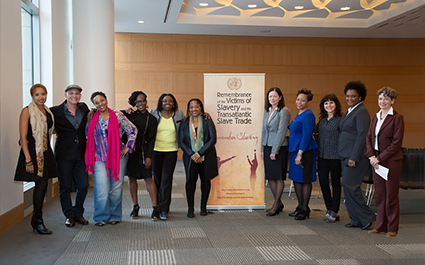Roundtable Discussion
"Truth: Women, Creativity and Memory of Slavery"
5 October 2015 -- The power of visual, literary and performing arts was centre stage at a roundtable discussion on 5 October 2015 on Truth: Women, Creativity and Memory of Slavery at Fordham University Lincoln Center Campus in New York. The event, organized by the United Nations Remember Slavery Programme in partnership with Fordham University, was one in a series on Women and Slavery, the 2015 theme chosen by the United Nations to honour the struggle of enslaved women during the Transatlantic Slave Trade and their heroic efforts to resist the institution of slavery and pass on their rich cultural heritage from Africa to their children.
The Truth: Women, Creativity and Memory of Slavery panel brought together artists and scholars to discuss the creative works of enslaved women throughout the African diaspora, and examined how their art was used to express, endure, survive and liberate – both themselves and their people. Through their presentations, the panel also shared various ways contemporary women artists of African descent have creatively represented the experience of enslaved women and explored what the world today can learn about the emancipating power of creativity.
In her opening remarks, Kimberly Mann, Chief, Education Outreach Section of the Department of Public Information, told the packed auditorium, which included UN staff and diplomats as well as faculty and students, about the United Nations Remember Slavery Programme’s commitment to help young people learn from this history in order to help fight racism and prejudice today. Mann also reminded the audience that countless stories of enslaved women’s heroism and valour in the face of unimaginable cruelty remain untold.
The discussion was moderated by Dr. Aimee Meredith Cox, Cultural Anthropologist and Professor of African and African American Studies at Fordham University. The panellists included: Dr. Deborah Willis - Chair of the Department of Photography & Imaging at the Tisch School of the Arts at New York University; Dr. Nicole R. Fleetwood, Associate Professor, Department of American Studies and Director of the Institute for Research on Women at Rutgers University, New Brunswick campus; Yolanda Arroyo Pizarro - award winning novelist, short story writer and essayist; Gabriela Salgado- Independent Contemporary Art Curator & Consultant in Europe and Latin America, Iyunolu Osagie- Associate Professor of English at Pennsylvania State University and Dr. Yuko Miki Assistant Professor of Iberian Atlantic History at Fordham University. Each presenter underscored the role of the arts in helping to ensure that enslaved women are given greater visibility in historical narratives which tends to focus only uprisings led by men.

